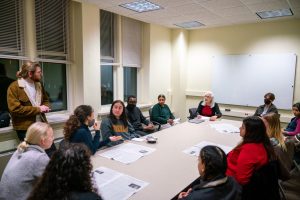Oberlin Students for Israel Respond to Criticism
March 4, 2011
To the Editors:
Last week, Sgt. Benjamin Anthony said that real peace needs to be more than just a political agreement, a sentiment with which Oberlin Students for Israel wholeheartedly agrees. The beginning of such a peace is understanding each other and actively learning about the intricacies of the situation, rather than merely painting the circumstances in black and white. It is a conscious choice to ignore the shades of grey. Rejecting dialogue as a tool in promoting peace impedes mitigation of the conflict by narrowing our understanding of the full spectrum of narratives. As such, while we disagreed with some of Anthony’s opinions, we were disappointed, disheartened and at times appalled by the conduct of individuals at the talk. To our announcement of the Oberlin College Dialogue Center-moderated dialogue, someone replied “F— OCDC!” Furthermore, when Anthony remarked on the realities of life and death for soldiers, he was met by the shout “They deserve to die!” Oberlin Students for Israel holds all lives as equal — that’s why we support a two state-solution and a withdrawal from the West Bank and the Gaza Strip.
All viewpoints should be understood but be subject to criticism. To that end, we appreciate the criticism offered and have offered our own critiques; however, we feel that criticism should be based on careful analysis and not on generalizations or assumptions. Only if one stopped listening after Anthony’s bold and inflammatory assertion about the use of white phosphorus would his argument have seemed outrageous and beyond comprehension. His point was that the use of ground forces is more humane than an imprecise airborne assault (in which distinguishing between civilians and combatants is much more difficult) and that, when used properly, white phosphorus is a necessity of an effective and safe ground assault. We will not attempt to offer our strategic military analysis of the situation, as we are not qualified to do so. We do however accept professional military analysis that white phosphorus is extremely effective as a smoke screen and as a luminescent. Irrespective of international law, we reject the notion that the collateral damage associated with the use of white phosphorus is acceptable; to the victim of white phosphorus injuries, it makes no difference the intended effect of the white phosphorus. Therefore, any use of white phosphorus that results in white phosphorus injuries to non-combatants is unacceptable.
This week, OSI brought Gershon Baskin to campus to speak. In this talk, he explained the feasibility of a two-state solution and spoke about his nearly 25-year-long career in bringing groups of Israelis and Palestinians together to collaborate on solving some of the most pressing issues of the peace process. Surprisingly, many of those who expressed their disagreement with Sgt. Anthony’s views were not present at this event. Baskin’s message reflects the opinions of a vast majority of OSI’s members and stands in opposition to the opinions of the Sergeant, as we clearly stated in our letter preceding his visit. In the Feb 11 issue of the Review, our letter stated: “He is not a representation of Oberlin Students for Israel’s opinions and views, but rather one of many voices that should be heard in understanding the Israeli-Palestinian and Israeli-Arab conflicts.” OSI believes in examining all narratives, advocating for a peaceful two-state resolution for the conflict and embracing our own potential for enacting change through political advocacy.
It is inaccurate to say that a discussion between Oberlin students about the conflict “promotes the idea that the conflict is one of equal proportions of power and responsibility.” Although the power dynamic between the two nations is real and substantive, the same power dynamic does not exist between Oberlin student groups who have equal agency to influence the dialogue surrounding the conflict. While we are far removed from the conflict on the ground, we encourage people to take positive action to promote peace. Join us in making meaningful progress, whether through raising money for micro loans for Palestinians or through grappling with the deeper nuances of the issue.
—Oberlin Students for Israel
–Ari Feinberg College
first-year co-chair
–Hadas Binyamini College
first-year co-chair

























